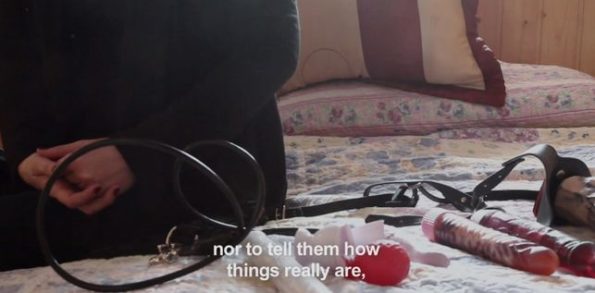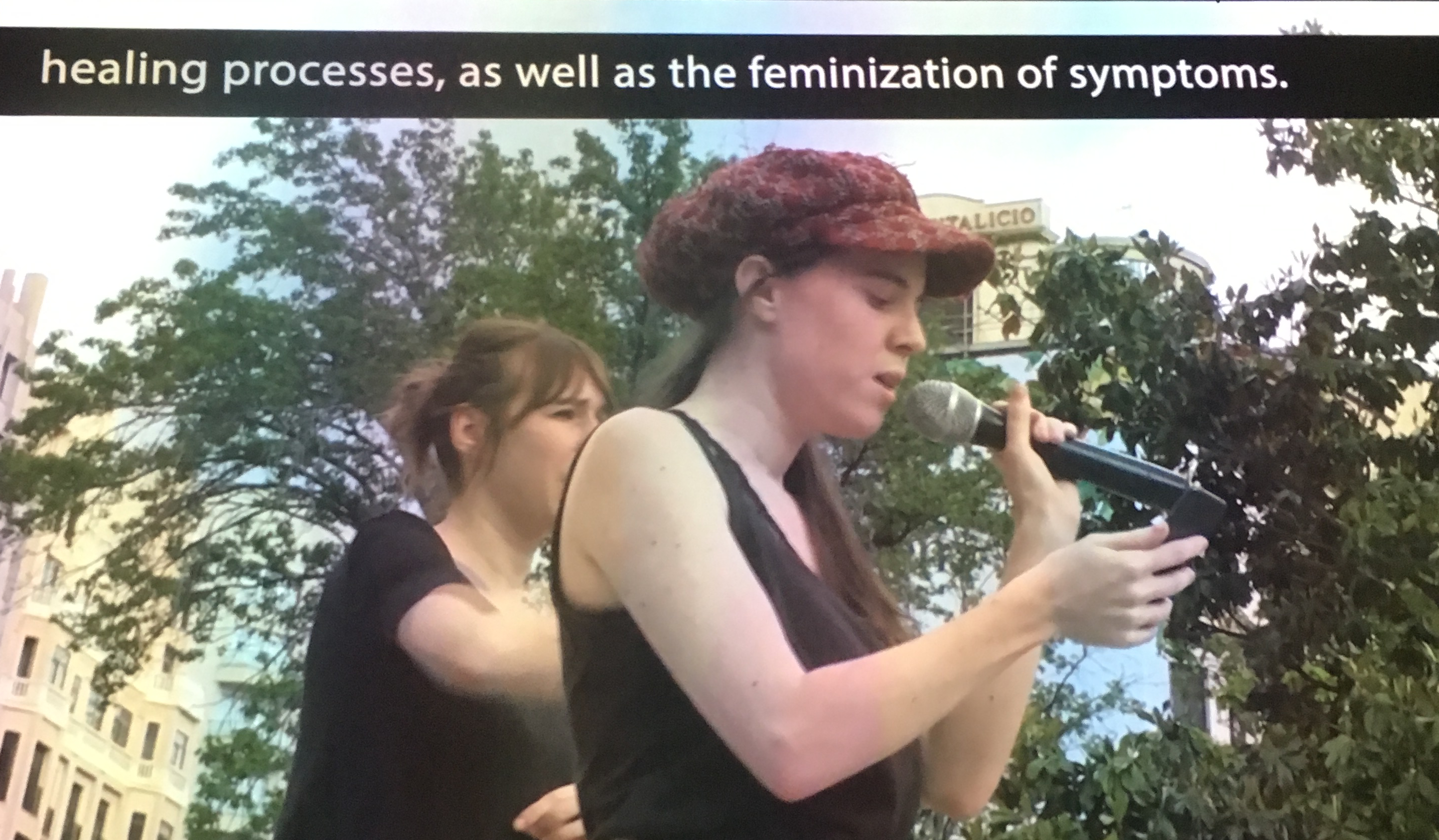Search
To search for an exact match, type the word or phrase you want in quotation marks.
A*DESK has been offering since 2002 contents about criticism and contemporary art. A*DESK has become consolidated thanks to all those who have believed in the project, all those who have followed us, debating, participating and collaborating. Many people have collaborated with A*DESK, and continue to do so. Their efforts, knowledge and belief in the project are what make it grow internationally. At A*DESK we have also generated work for over one hundred professionals in culture, from small collaborations with reviews and classes, to more prolonged and intense collaborations.
At A*DESK we believe in the need for free and universal access to culture and knowledge. We want to carry on being independent, remaining open to more ideas and opinions. If you believe in A*DESK, we need your backing to be able to continue. You can now participate in the project by supporting it. You can choose how much you want to contribute to the project.
You can decide how much you want to bring to the project.

Caterina Almirall:I was thinking about the idea of the festivals’ own theme: “Production”, from the perspective of the spectator and the critic, (of the one who sees and of the one that is affected by and of the one that shares knowledgement about what he sees); especially from the bodies that make it. How “production” goes through our body, affects what we are, mobilizes, saturates, collapses, exhausts, stimulates.
With the proposal of A*DESK as an observant entity of the Loop, A*DESK had to split into several bodies, bodies that had to be coordinated to be one, or multiple, depending on how you look at it. Because it was impossible to carry out the proposal by just an individual body.
To be able to produce critic you have to see, to see you have to go, to go you have to be and for and to do so you have to be able to be. Moreover, you have to share, so you have to be more than one. I would even say that this is in part the essence of the critic: the dialogue. Hence this text as well.
Carolina Jiménez:You talk about “producing” criticism, evoking as well its limits and the materiality that constitutes it, and the criticism that Dorothea von Hantelmann makes to Lucy Lippard about the impossibility of the dematerialized art work comes to my mind. Its materialization happens through documentation, writing and, overall, our bodies calming its right to appear. Bodies that tend to be connected by some susceptibility and loneliness conditions hidden behind the screen. I think that the idea of the criticism as practise is very interesting, in this case cooperative, if I go back to Hantelmann, it would have more to do with the ways of doing than with saying. A criticism that not only inhabits the theory nor insists on the epic fantasy of the superobserver eye that, in addition, must “make sense”, but that is rehearsed as a practise of care and of the accompaniment beyond the static set of decisions. Criticism as a space of confluence where alliances can be generated, based on dialogue, but open at the same time to the dissent and unexpected. A practise that in our case was set in actions as quotidian as creating a WhatsApp group, organizing a schedule, coordinating availabilities, having turns, sharing pictures, exchanging opinions or buying pizza for dinner after the inauguration.
Although I doubt that Hans Ulrich Obrist refers to something similar when during the speech at Loop Talks alluded to the work of the C as the one that “makes the dreams of the artists come true” (we make artist’s dreams happen). If we take away the demiurgic licenses allowed by Obrist from such a statement, what we have left is a “make things happen”, that is, to produce.
Caterina:Now that you have mentioned Lucy Lippard, I have just been rereading her these days preparing some lessons of contemporary art, and, well even knowing it is very impacting how in the story that she makes about the conceptual art, goes directly to a “dematerialized” art, but yet totally embodied, and very similar to the demiurgic matter proposed by Obrist. An art that leaves the artist alone with his gestures through which he transforms matter, and at the same time the agency capacity of the latter. An art in which there are no “words”, there are people pointing at things. Obrist would be the author of this immaterial production: with his finger he points at an artist and makes him jump from invisibility to hypervisibility. A very neoliberal art in general, which produces value rather than “works”.
Lucy Lippard also coincides with this moment in which the ones that were not artists were critics, like her, but she slowly started to “curate” exhibits, and there is a transaction from the critic to organizer –producer of exhibits-, who points at artists. But I don’t think, like Obrist, that curatorship or criticism have to do with “making anyone’s dreams come true”, but that in both cases it’s about weaving collaborative relationships. I do believe in the power of the gestures of artists and other agents, but from the perspective of a context in which these powers work (as Marcel Mauss said, the effectiveness of the magic act is the consequence and not the reason of the belief in the powers of the magician) … and that context is of the contemporary art. For this reason, the relational question in all cases is essential, because these nets are the ones that allow powers to work.
Carolina:In fact, Lippard in a recent interview with Consonni explains that when she started to with the art criticism she was not a feminist and that she become during the process: “I started writing and I realized that I was ashamed to be a woman. Then I had to know why. Later I got annoyed”.
Irina Mutt: We talk about production, about making things and materialise them. Then, there is the possibility to place, to position. Talking about production in a fair seems right to me, is hard work to think about material conditions and production times. But who produces more and better, who talks and from where. I think these are as important matters as the resources management and the economies of production.
During the fair of Loop, I spent a lot of time in the room of the hotel in which ADN gallery showed the video De putas by Núria Güell. De putas is a look at the hegemonic masculinity explained by sex workers. Talks about how men treat sex workers, women. OF how are the clients of the sex workers in the privacy, about their fears, perversion and power plays. The format is a documentary, based on the interviews. The privacy of the sex workers is respected: their faces are not visible. Only their bodies and voices. The body-sexual object of the masculine look here becomes more like a body that he knows. A body placed, personal and politic.
During the video women talked about anecdotes and reflections about masculinity. At times I laughed watching the video, nodding my head, agreeing with them, with the sparkle in my eyes to see the patriarchy burning. Núria Güell was there and we were able to talk for a while about the process of the project, sex workers’ unions, rancid abolitionism, Virgine Despentes. A video in which there are basically interviews, that expands in other formats such as books and publications. Make space to talk about work experiences –and production- in the first person. Just at a time when hegemonic feminisms and political parties deny the possibility of unionizing a collective. Just at the moment when the turn to the right crashes us against what we thought we had guaranteed. Just when it seems that the options are reduced to being able to “keep going” in a day to a day every time greyer. Is at these moments when it is more necessary to shorten distances and to stop thinking that what we post in the social media or see in the media is going to pass us by the side without affecting. Understanding that if politics fuck up sexual workers, immigrants, single mothers, trans women or domestic workers, they are going to touch us all.
Or is that “if they touch us one they touch us all” only applies to a few?
Carolina: María Rubio with her work Estado de Malestar (malestar_exhuberancia_anomalía), which was shown for the first time at Arts Santa Mònica during Loop Festival. looks into “who produces more and better” and the consequent multiplication of forms of stress, depression and other mental illnesses. The movie focuses on the pathologization and privatization of mental health problems and the political immobilization that this produces as one of the elements of the post-disciplinary context of late capitalism. The precariousness of work, the combination of technologies and managerialism, the commitment to the so-called “continuous professional development” of cognitive capitalism have brutally increased the pressure on workers, and even more so, on female workers, as some women from the InsPiradas Collective explain in the documentary.
Depression and stress are the other face of the “unidimensional” worker of who Nina Power talks about. A worker who is expected not to disappoint the company, or herself, not showing enough enthusiasm, dedication, level… or worse, getting pregnant. I think Power’s idea that all the work has become women’s work, even men’s work, is fundamental. She points out how the enthusiastic professional is the symbol of the working world as a whole, whereas according to Paolo Virno, “correctly understood post-fordist ‘professionalism’ does not correspond to any specific profession. Rather, it consists of certain character traits”.
Remedios Zafra also writes about enthusiasts and underlines how creative and cultural jobs are a system fed by enthusiasm and immaterial payment, which either promote resignation or are based on the idealization of vocational affective and altruistic practices, in which feminized precariousness exists. Or Hito Streyerl who suggests that cultural work involves new forms of exploitation and a high rate of unpaid work, as occurs in domestic work and care. And today those who take care of our grandparents and clean our homes are mostly immigrant women. So yes, as you say Irina, if they fuck up sex workers, immigrants, single mothers, trans women, they fuck us all. Not with the same degree of violence, though: race and class privileges are an invisible suitcase full of special provisions. That’s why I insist on your point about the need to place who’s talking and from where.

María Ruido, Estado de Malestar (malestar_
Highlighted image: Nuria Güell, De putas. Un ensayo sobre la masculinidad, 2018

Caterina Almirall has only just been born into this world, but has lived in others, in similar parallel worlds, both liquid and solid. From each she has learnt something, and forgotten something else. Learning to unlearn. In all of these worlds she has been caught up in a web that interweaves everything, some call it ’art’…Entwining, unravelling, weaving and destroying this labyrinth has been her occupation in each one of these planets, and she fears that it will be the same in each of the ones to come.

Carolina Jiménez is a curator and researcher.

Irina Mutt she keeps on quoting Annie Sprinkle.
"A desk is a dangerous place from which to watch the world" (John Le Carré)